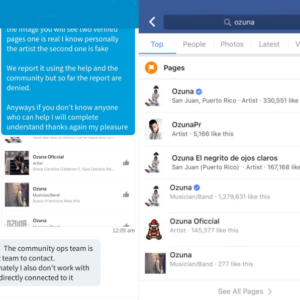Facebook Under Scrutiny for Failure to Stop Fake News
— January 3, 2017
One might think that in the wake of what could be Facebook’s worse news cycle in years that any incidence of fake accounts would be a top priority. However, the images below say otherwise.
Just when the world stopped talking about Facebook’s failure to reign in fake (election-related) news, the social media giant was singled out yet again. However, this time it’s Germany who accuses the platform of being irresponsible for calling the Berlin Christmas terror act an ‘attack’ before the authorities officially declared it as such.
The incident prompted German Justice Minister Heiko Mass to criticize the social media company for “earning an awful lot of money with fake news.” Mass went on to say that, “a company that earns billions from the internet also has a social responsibility. It needs to be easier for users to report the fake news.”
Interestingly, many have echoed Minister Mass’ sentiments about the ease of reporting fake news on Facebook. However, now that the social network has already begun rolling out their fake news reporting feature, perhaps the bigger question surrounding the issue is, ‘how do you eliminate false stories in their entirety?
Reportedly Germany’s answer is to punish the platform rather than the fake news site. The German government is in the midst of planning a new law that could impose fines of up to 500,000 EUR on Facebook for any fake news articles on the site that could potentially play a role in the country’s 2017 elections.
Facebook Countermeasures
Facebook has already announced plans to combat fake news going forward. Any organization who uses Facebook’s advertising features to promote and post fake news will be banned permanently from using the wildly popular social media platform. Facebook has already begun implementing this by prohibiting organizations that use false medical claims to sell supplements. They also use a similar strategy to prevent groups from purchasing ads that “exploit controversial political or social issues for commercial purposes.”
Although many view this step as an effective method to combat Facebook’s fake news problem, the fact remains that as Mass pointed out, the social media site has been profiting from fake news ads for many years. Nonetheless, the recent onslaught of negative publicity may have forced the company to make the issue a bigger priority.
How Fake News Works
Anyone that produces fake news understands there are tremendous profits to be made from publishing knowingly false information and allowing it to go viral on Facebook. Display ad revenue generated by fake news sites can reach up to $ 30,000 per month. One fake news producer recently told Buzzfeed that he has made thousands of dollars per day in revenue. Although major sites such as Google and now Facebook have taken steps to block these sites from their advertising platforms, there are still dozens of advertising networks more than willing to display the ads on their websites. With these systems, the promise of profit wins out over any concerns over faulty news.
The first step for any producer of false news is to publish a story containing blatantly false information on one of the many fake news websites. The story is then placed into the advertising queue on Facebook and begins showing up in users’ newsfeeds. Facebook earns money either from every user who clicks the link or from every 1,000 users who see the ads.
Next, when a user clicks on any of the ads, they are taken to the fake news publisher’s website. Doing so generates an impression each time the display ad is reloaded onto a browser. The fake news site earns money from these impressions, which can amount to millions of impressions and thousands of dollars per month. Since these publishers must have a Facebook account to place ads, they can then promote their page heavily to gain the traffic they need to keep those impressions coming and make their stories go viral.
Since the cost of the Facebook ads are significantly less that the thousands of dollars in profit coming in from impressions, this is a highly profitable business model for fake news publishers.
Putting an End to Fake News on Facebook
If Facebook really wants to curtail the proliferation of fake news on its platform, it first needs to disrupt the business model which has made fake news sites and Facebook itself millions of dollars over the years. The platform also needs to deny the use of any paid features that are used to promote fake news, therefore eliminating news feed and sidebar ads, page post promotion, and page marketing for these publishers.
Another effective action would be for Facebook to simply block any 3rd party attempts to promote or advertise links that point to fake news sites. Currently, any individual with a Facebook account can create a public page and use it to run ads for fake news stories in users’ newsfeeds. A total ban on all advertising links to fake news sites would prevent publishers from gaming the system by setting up deceptive Facebook pages for the sole purpose of advertising their sites.
Additional Considerations
In addition to fake news publishers, another challenge that Facebook faces is dealing with the scores of fake likes and accounts that exist on the social media network. These fake accounts show up despite the platform’s robust security screening. There are have also been accusations that some verified users change their names to fictitious cartoon characters to make it harder for Facebook to spot and remove them. Add to this the fact that the social behemoth has been slow in responding to reports of suspicious behavior on the site and it’s evident that we haven’t seen the end of this story.
In closing, this is not about blaming Facebook. After all, they deserve some credit for proactively working to thwart the problem. However, given all that they’re up against it just seems like more could be done. The good news is that they already have all the tools that are needed to eradicate fake news from their platform. It remains to be seen whether they will use them and eliminate the controversy once and for all.
Digital & Social Articles on Business 2 Community
(34)



